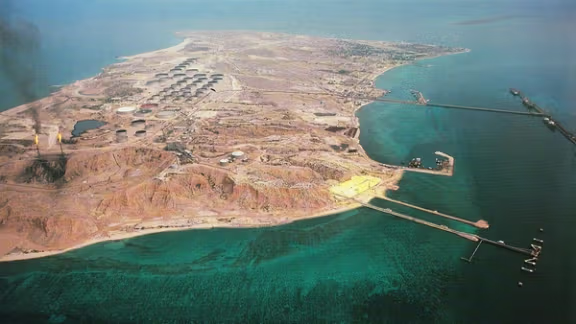The naming and sovereignty of the body of water and its islands are a deep-felt issue inside Iran and among its diaspora and stands as one of the few political themes uniting the Iranian people.
The EU-GCC joint statement on Wednesday described three Iranian-controlled Persian Gulf islands disputed between the Islamic Republic and the United Arab Emirates as "occupied" and urged Iran to relinquish control.
Greater Tunb, Lesser Tunb, and Abu Musa islands have been held by Tehran since 1971 after the withdrawal of British forces from the Persian Gulf.
"Iran's territorial integrity is not a subject for foreigners to dare discuss," government spokesperson Fatemeh Mohajerani said in a post on X.
"(The islands) are inseparable parts of Great Iran. The European Union and the Persian Gulf Cooperation Council are in no position to comment on the great land of Iran," she added.
Iran’s foreign minister Abbas Araghchi, who just completed a diplomatic tour of the Arab world to shore up support ahead of a likely Israeli attack, condemned the move as a colonial practice but spared Arab states.
"The three islands have always belonged to Iran and will forever remain as such. The era of European malign 'divide & rule' interference in our region is long over," he wrote on X.
The spokesperson for Iran’s Ministry of Foreign Affairs went further, characterizing the statement as a violation of the international system's core principles.
"This is a clear indication of the member states' lack of commitment to the principles and objectives of the United Nations Charter, especially the principle of respect for national sovereignty and the territorial integrity of states,” Esmail Baghaei said.
Iran maintains that the islands have been an intrinsic part of its sovereign territory, asserting that it has never ceded ownership. The UAE counters that throughout the 19th century, the islands were under the jurisdiction of the Qasimi sheikhs and that their claim was transferred to the UAE upon its establishment in 1971.
The islands came under British administration in 1921, but on November 30, 1971—one day after British forces withdrew and just two days before the UAE's official formation—Iran's then-monarch, Mohammad Reza Shah, ordered the Iranian navy to take control of all three islands.
Iranian military forces have remained on the islands ever since, with Abu Musa being the only one inhabited by a civilian population which numbers fewer than two thousand.
The Prince's speech
The Shah's son, exiled Prince Reza Pahlavi - one of the most prominent Iranian opposition figure - also weighed in harshly.
"If the European Council were serious about addressing the threat of the Islamic Republic, it would designate the IRGC a terrorist organization and back UN sanctions on the regime," he said, referring to the Islamic Revolutionary Guard Corps.
"Instead, it insults the Iranian people by supporting perversions of history and colonialist violations of Iranian territorial integrity. Iran's sovereignty over the islands of Greater Tunb, Lesser Tunb, and Abu Musa is not up for debate."
Iranian social media accounts too were ablaze with anger, with many users ranging from government supporters to dissidents arguing for Iran's sovereignty over the islands.
Political activist Fariborz Karami Zand, who has over half a million followers on X, directed his ire at Josep Borrell, the EU’s High Representative for Foreign Affairs.
"The UAE’s claims over these islands have no historical or legal foundation. Any discussions about Iran’s territorial integrity must be based on historical facts, not on groundless fantasies."
The EU-GCC joint statement represents a growing international trend of supporting the UAE's claims to the islands. In recent years, key international players, including the United States, Russia, and China, have leaned towards supporting the UAE in this dispute.
China expressed its support for the UAE's claims during a meeting in June, while Russia backed the UAE's position during a summit with GCC ministers in December last year. The moves have left Iran feeling increasingly isolated on the international stage regarding the issue.
Iran's standing in the West has been increasingly marred by its alignment with groups such as Hezbollah and Hamas, as well as its deepening military cooperation with Russia since its full-scale Ukraine invasion.








